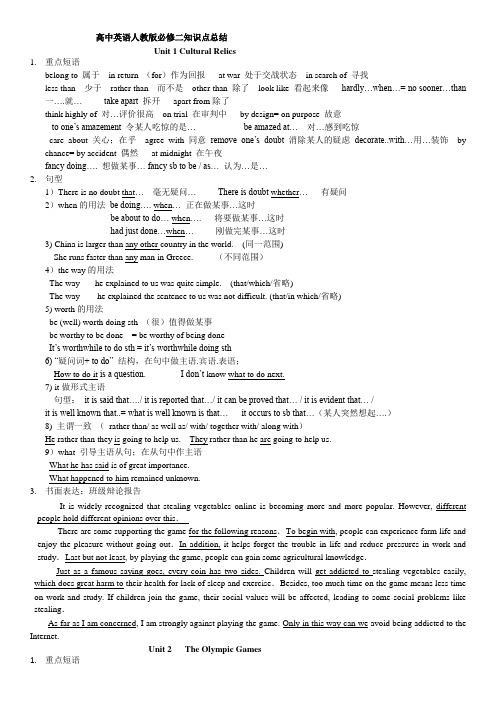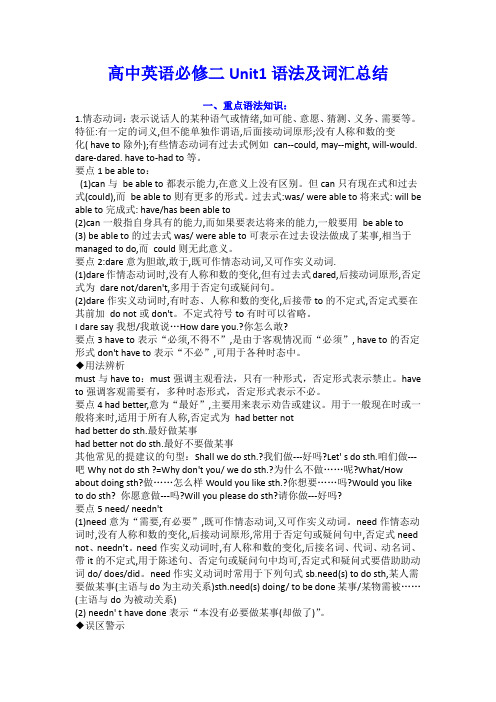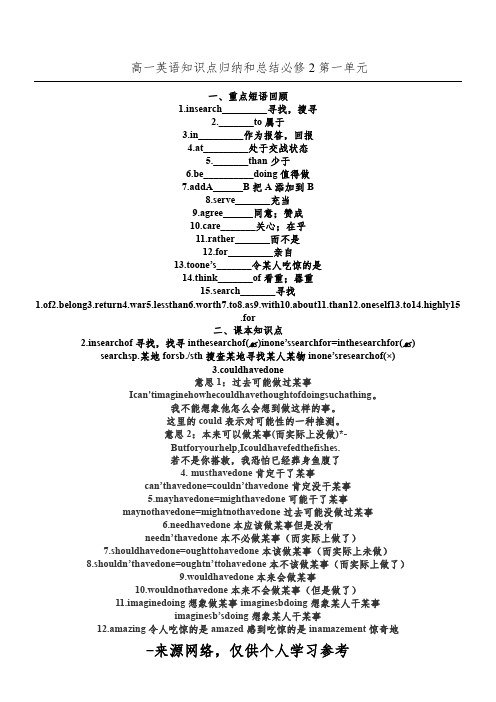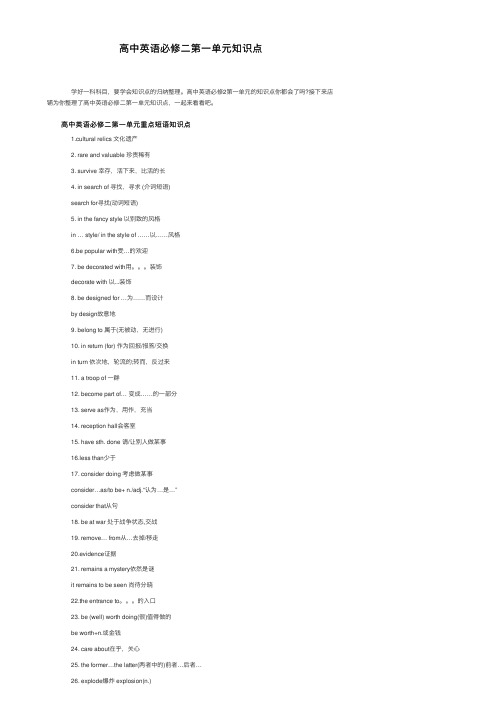高中英语必修二第一单元知识点总结
人教版高中英语必修二Unit 1 Cultural relics的重要知识点

人教版高中英语必修二Unit 1 Cultural relics的重要知识点1. 词汇与短语:- look into:调查- consider:认为,考虑- in return:作为报答- take apart:拆开- make into:制成- remove:移走- belong to:属于(无进行时和被动语态)- rather than:而不是- remain:保持不变- be popular among/with:在……中流行- survive:幸存下来,后面可以直接加表示“灾难”的名词,如war, flood, fire, accident, earthquake, shipwreck等。
翻译时,可以先将survive后的名词译成“经过……后”,然后再译“幸存下来”。
2. 语法与句型:-注意理解并掌握属于(belong to)这个短语的无进行时和被动语态的特点。
-学习如何在句子中正确使用survive这个单词,并理解其与其他表示“幸存”的单词或短语的区别。
3. 话题与语境:-本单元主题为“文化遗迹”,涉及到文化遗迹的定义、重要性、保护方法等相关话题。
在学习过程中,可以通过阅读相关的文章、观看纪录片等方式,加深对文化遗迹的理解。
-学习如何在不同的语境中运用所学的词汇和短语,如讨论文化遗迹的保护、描述文化遗迹的特点等。
4. 写作技巧:-学习如何撰写关于文化遗迹的文章,包括介绍文化遗迹的历史背景、文化价值、保护现状等。
-掌握在文章中正确运用所学的词汇和短语,使文章表达清晰、准确。
5. 听力与口语:-通过听力材料了解不同地区的文化遗迹及其背后的故事。
-练习用英语讨论文化遗迹相关的话题,提高口语表达能力。
通过掌握以上知识点,学生可以更好地理解和运用英语来讨论文化遗迹这一话题,提高英语综合运用能力。
高中英语人教版必修二知识点总结Unit 1 Cultural Relics

高中英语人教版必修二知识点总结Unit 1 Cultural Relics1.重点短语belong to 属于in return (for)作为回报at war 处于交战状态in search of 寻找less than 少于rather than 而不是other than 除了look like 看起来像hardly…when…= no sooner…than 一….就… take apart 拆开apart from除了think highly of 对…评价很高on trial 在审判中by design= on purpose 故意to one’s amazement 令某人吃惊的是… be amazed at… 对…感到吃惊care about 关心;在乎agree with 同意remove one’s doubt 消除某人的疑虑decorate..with…用…装饰by chance= by accident 偶然at midnight 在午夜fancy doing…. 想做某事… fancy sb to be / as… 认为…是…2.句型1)There is no doubt that… 毫无疑问… There is doubt whether… 有疑问2)when的用法be doing…. when… 正在做某事…这时be about to do… when…. 将要做某事…这时had just done…when… 刚做完某事…这时3) China is larger than any other country in the world. (同一范围)She runs faster than any man in Greece. (不同范围)4)the way的用法The way___ he explained to us was quite simple. (that/which/省略)The way ___ he explained the sentence to us was not difficult. (that/in which/省略)5) worth的用法be (well) worth doing sth (很)值得做某事be worthy to be done = be worthy of being doneIt’s worthwhile to do sth = it’s worthwhile doing sth6) “疑问词+ to do” 结构,在句中做主语.宾语.表语;How to do it is a question. I don’t know what to do next.7) it做形式主语句型:it is said that…./ it is reported that…/ it can be proved that… / it is evident that… /it is well known that..= what is well known is that… it occurs to sb that…(某人突然想起….)8) 主谓一致(rather than/ as well as/ with/ together with/ along with)He rather than they is going to help us. They rather than he are going to help us.9)what 引导主语从句;在从句中作主语What he has said is of great importance.What happened to him remained unknown.3.书面表达:班级辩论报告It is widely recognized that stealing vegetables online is becoming more and more popular. However, different people hold different opinions over this.There are some supporting the game for the following reasons.To begin with, people can experience farm life and enjoy the pleasure without going out.In addition, it helps forget the trouble in life and reduce pressures in work and study.Last but not least, by playing the game, people can gain some agricultural knowledge.Just as a famous saying goes, every coin has two sides. Children will get addicted to stealing vegetables easily, which does great harm to their health for lack of sleep and exercise.Besides, too much time on the game means less time on work and study. If children join the game, their social values will be affected, leading to some social problems like stealing.As far as I am concerned, I am strongly against playing the game. Only in this way can we avoid being addicted to the Internet.Unit 2 The Olympic Games1.重点短语stand for 代表;象征stand out 显眼,突出every four years = every fourth year 每四年take part in 参加play a part/role in… 在…中起作用as a matter of fact = in fact 事实上admit doing/ having done/ that-clause 承认做了某事be admitted to/into 被允许进入/录取compete with/against sb for sth 为某物和某人竞争volunteer to do sth 自愿做某事take place 发生take the place of = replace 代替in place of = instead of 代替in charge of 负责.. in the charge of .. 由…负责charge sb with sth = accuse sb of sth 因.. 指控某人free of charge 免费be allowed to do 被允许做make a bargain with sb. 和某人达成协议bargain with sb over/ about/ for sth 就某事与某人讨价还价one after another 一个接一个fall down 跌倒hear of 听说change one’s mind改变主意pick up 捡起/ 用车接/ 学会2. 重点知识点1)deserve的用法(用法相似的动词:need/want/require doing= need/want/require to be done 需要….)deserve to do sth 应该做/值得做deserve doing = deserve to be done 值得… (doing 表被动意义) Your suggestion deserves to be considered = deserves considering.2) take part in : 参加有组织的,重大的活动join in 参加正在进行的活动join: 参加团体,党派和组织(join the army; join the party)attend: 出席,参加,后跟meeting,wedding,class, course等3) nor/ neither + 助动词/ be /情态动词+ 主语:表示“…也不这样”I have never been abroad, and neither/ nor has he.If you don’t go to the party, nor will I.He is a diligent student, and she doesn’t like music. So it is with me./ It is the same with me.4) as …as… 的用法He is as tall as his brother.as + adj. + a/an + n + as… / as + many/much + n. + as…像…那样;正如He is as good a teacher as my brother.Unit 3 Computers1.重点短语have something/nothing in common 有/ 无共同之处compare ..w ith….比较according to 根据from…on.. 从….起go by 经过as well as 和as well 也as a result 结果是as a result of 由于… result in 导致result from 起因于the way to do/ of doing sth 做某事的方法in a way 在某种程度上in the way 挡道in no way 绝不with the help of sb = with sb’s help 在某人的帮助下deal with 处理achieve/ reach the goal 实现目标apply for 申请apply to 应用于watch over 看守;监视be crazy about 对..着迷a solution to…解决办法after all 毕竟consist of 由….组成come true 实现make good use of 好好利用give away 泄露,捐赠can’t help doing sth 情不自禁做某事as time goes by = with time going by 随着时间的流逝2.重点知识点1)主语+ be + adj + to do The question is easy to answer.3). 状语从句的省略在when, while, if, unless, though, once等引导的状语从句中从句的主语和主句的主语一致, 且从句中的谓语含有be动词时, 为了使句子简洁, 可省略从句中的主语和be动词。
高中英语必修二Unit1语法及词汇总结

高中英语必修二Unit1语法及词汇总结一、重点语法知识:1.情态动词:表示说话人的某种语气或情绪,如可能、意愿、猜测、义务、需要等。
特征:有一定的词义,但不能单独作谓语,后面接动词原形;没有人称和数的变化( have to除外);有些情态动词有过去式例如can--could, may--might, will-would. dare-dared. have to-had to等。
要点1 be able to:(1)can与be able to都表示能力,在意义上没有区别。
但can只有现在式和过去式(could),而be able to则有更多的形式。
过去式:was/ were able to将来式: will be able to完成式: have/has been able to(2)can一般指自身具有的能力,而如果要表达将来的能力,一般要用be able to(3) be able to的过去式was/ were able to可表示在过去设法做成了某事,相当于managed to do,而could则无此意义。
要点2:dare意为胆敢,敢于,既可作情态动词,又可作实义动词.(1)dare作情态动词时,没有人称和数的变化,但有过去式dared,后接动词原形,否定式为dare not/daren't,多用于否定句或疑问句。
(2)dare作实义动词时,有时态、人称和数的变化,后接带to的不定式,否定式要在其前加do not或don't。
不定式符号to有时可以省略。
I dare say我想/我敢说…How dare you.?你怎么敢?要点3 have to表示“必须,不得不”,是由于客观情况而“必须”, have to的否定形式don't have to表示“不必”,可用于各种时态中。
◆用法辨析must与have to:must强调主观看法,只有一种形式,否定形式表示禁止。
高中英语必修二第一单元知识点总结

高一英语知识点归纳和总结必修2第一单元一、重点短语回顾1.insearch_________寻找,搜寻2._______to属于3.in_________作为报答,回报4.at_________处于交战状态5._______than少于6.be__________doing值得做7.addA______B把A添加到B8.serve_______充当9.agree______同意;赞成10.care_______关心;在乎11.rather_______而不是12.for_________亲自13.toone’s_______令某人吃惊的是14.think_______of看重;器重15.search_______寻找1.of2.belong3.return4.war5.lessthan6.worth7.to8.as9.with10.about11.than12.oneself13.to14.highly15.for二、课本知识点2.insearchof寻找,找寻inthesearchof(✍)inone’ssearchfor=inthesearchfor(✍)searchsp.某地forsb./sth搜查某地寻找某人某物inone’sresearchof(×)3.couldhavedone意思1:过去可能做过某事Ican'timaginehowhecouldhavethoughtofdoingsuchathing。
我不能想象他怎么会想到做这样的事。
这里的could表示对可能性的一种推测。
意思2:本来可以做某事(而实际上没做)*-Butforyourhelp,Icouldhavefedthefishes.若不是你搭救,我恐怕已经葬身鱼腹了4.musthavedone肯定干了某事can’thavedone=couldn’thavedone肯定没干某事5.mayhavedone=mighthavedone可能干了某事maynothavedone=mightnothavedone过去可能没做过某事6.needhavedone本应该做某事但是没有needn’thavedone本不必做某事(而实际上做了)7.shouldhavedone=oughttohavedone本该做某事(而实际上未做)8.shouldn’thavedone=oughtn’ttohav edone本不该做某事(而实际上做了)9.wouldhavedone本来会做某事10.wouldnothavedone本来不会做某事(但是做了)11.imaginedoing想象做某事imaginesbdoing想象某人干某事imaginesb’sdoing想象某人干某事12.amazing令人吃惊的是amazed感到吃惊的是inamazement惊奇地toone’samazement令人惊奇的是=toone’ssurprise13.beusedtodosth被用来做某事usedtodosth过去常常做某事beusedtodoingsth习惯于干某事15.inthefancystyle以奇特的风格17.takesb.timetodosth.花费某人时间做某事18.infact=inactualfact=asamatteroffact事实上19.bedesignedfor专为什么设计的bedesignedtodosth打算做……用的bydesign=onpurpose故意地20.belongto没有被动语态不用于进行时isbelongingto(×)wasbelonged(×)belongto中的to不可以省略。
必修二unit1知识点总结

必修2 Unit 1 Cultural relics1. in search of…寻找… Search sb 搜身search for 寻找search sb. / a place for sth. 搜身/搜查某个地方找某事物2. could not/never have done 不可能做过某事3. be used to do sth. 被用来做…The wood will be used to make tables and chairs.be used to doing sth. 习惯于做…He is used to living with the farmers now.used to do sth. 过去常常做…She used to come a lot, but now we seldom see her.4. make it 达到目的,取得成功5. in the fancy style 以一种奇特的风格in style 流行out of style 过时6. decorate. v. 装饰decoration. n. 装饰decorate sth. with sth. be decorated with sth.7. survive: v. 生存,存活,经历(事故、灾难后)还活着,幸存,比…长寿survival: n. 生存,幸存survivor: n. 幸存者8. by design = on purpose 故意地by chance = by accident 偶然地9. belong to 属于,是…其中的一员或一部分(无被动,无进行时)In our country, land doesn’t belong to any individual.Belonging to the developing countries, China faces many difficulties.10. in return 作为报答in return for…作为对…的报答11. Serve v. 服务service n. 服务serve as 担任,充当He serves as a waiter here. The box can serve as a table.12. reception desk 接待处give a warm reception to…热情地接待…13. have/get sth. done 使…被做I must have/get my homework finished before going out to play.14. light: v. 点燃,照亮light up 点(烟),照亮,(使)变亮,(脸等)放光彩Her eyes lit up with joy.light的过去式和过去分词有两种:lit和lighted,作为动词时二者可通用,但作定语时,只能用lighted. He lit/lighted a candle and handed the lighted candle to me.15. consider doing sth. 考虑做…. be considered to be…被认为…16. wonder: v. 想知道,感到惊奇,疑惑n. 奇迹,奇人/事(It’s) no wonder (that)…难怪…He hasn’t slept at all for three days. No wonder (that) he is worn out.17. at war 处于战争状态18. remove:v. ①搬开,拿开,移动②去掉,消除③脱掉④搬家,迁移His name was removed from the list.19. furniture: n. 家具(不可数) a piece of furniture = an article of furnitureThey didn’t buy much furniture before they got married.20. doubt: v. n. 怀疑,疑惑动词doubt在肯定句中,后跟if/whether引导的宾语从句,在否定句/疑问句中后跟that引导的宾语从句。
英语高一必修二unit1知识点总结

英语高一必修二unit1知识点总结英语高一必修二 Unit 1 知识点总结高中英语必修二 Unit 1 主要学习了有关“人与动物”的知识。
在这个单元中,我们学习了动物的分类、特征、保护和与人类的关系等方面的内容。
以下是对该单元的知识点进行总结。
一、动物的分类动物按照不同的特征进行分类,常见的分类方法有脊椎动物和无脊椎动物、冷血动物和温血动物、哺乳动物和非哺乳动物等。
1. 脊椎动物(Vertebrates):具有脊柱的动物。
如鸟类(Birds)、鱼类(Fishes)、哺乳动物(Mammals)等。
2. 无脊椎动物(Invertebrates):没有脊柱的动物。
如昆虫(Insects)、软体动物(Mollusks)、节肢动物(Arthropods)等。
二、动物的特征不同的动物在外貌、生理特征等方面存在着差异。
以下是一些动物特征的总结:1. 鸟类的特征:具有羽毛和嘴,可以飞行。
2. 哺乳动物的特征:具有乳腺,能够哺乳喂养幼崽。
3. 爬行动物的特征:行动呈爬行状态,如蛇、龟等。
4. 两栖动物的特征:同时能在水中和陆地上生活,如青蛙等。
5. 鱼类的特征:生活在水中,呼吸通过鳃完成。
三、动物保护动物保护是我们应该关注和重视的问题。
以下是一些动物保护的常见方面:1. 保护野生动物及其栖息地。
2. 防止非法捕猎、盗猎和买卖野生动物及其制品。
3. 提倡保护动物的法律法规。
四、动物与人类的关系人与动物之间存在着密切的联系和相互依赖。
以下是一些动物与人类的关系的例子:1. 动物是人类的食物来源之一,如牛、猪、鸡等。
2. 动物在科学研究和医学领域具有重要意义,如实验动物。
3. 动物提供给人们情感上的陪伴,如宠物。
4. 动物在生态系统中扮演着重要的角色,如传粉媒介和控制害虫等。
结语高中英语必修二 Unit 1 知识点总结了动物的分类、特征、保护和与人类的关系等方面的内容。
通过对这些知识点的学习,我们能够更好地了解动物世界,增强对动物保护的意识,从而更好地与动物共同生活在这个地球上。
高一英语必修二unit1知识点总结

高一英语必修二unit1知识点总结高一英语必修二 Unit 1 知识点总结Unit 1: Cultural relicsIn this unit, we have learned about cultural relics and how they reflect the history, culture, and traditions of a nation. Let's summarize the key points we have covered:1. Introduction to Cultural Relics- Cultural relics are objects of historical, artistic, or scientific interest that hold cultural significance.- They can be categorized into tangible cultural relics (such as sculptures, paintings, and artifacts) and intangible cultural relics (such as traditional customs, performing arts, and rituals).- Cultural relics help us understand the past, preserve cultural heritage, and promote cultural exchange.2. The Importance of Cultural Relics- Cultural relics provide insights into the history, values, and beliefs of a society.- They contribute to the development of national identity and pride.- Cultural relics attract tourists, boost the economy, and promote cultural tourism.3. Protection of Cultural Relics- The preservation and protection of cultural relics are essential to maintain our cultural heritage.- Governments and organizations play a crucial role in safeguarding cultural relics through legislation and conservation efforts.- Individuals can also contribute by raising awareness, participating in restoration projects, and respecting cultural relics.4. Famous Cultural Relics in China- The Great Wall: An iconic symbol of Chinese civilization and a UNESCO World Heritage Site.- The Terracotta Army: Discovered in the mausoleum of Emperor Qin Shi Huang, it represents the military might of ancient China.- The Forbidden City: Located in Beijing, it served as the imperial palace for 24 emperors during the Ming and Qing dynasties.- The Mogao Caves: Situated along the Silk Road, these caves house a collection of Buddhist art and scriptures.5. Cultural Relics Around the World- The Pyramids of Egypt: Constructed as tombs for pharaohs, they showcase ancient Egyptian civilization.- The Acropolis of Athens: A group of historical buildings including the famous Parthenon, representing ancient Greek culture.- Stonehenge: A prehistoric monument in England that raises questions about its purpose and construction.6. Cultural Relics and Tourism- Cultural relics are major tourist attractions, drawing visitors from around the world.- Tourism provides financial support for the preservation and restoration of cultural relics.- It is crucial to balance tourism with the need for conservation to ensure the long-term sustainability of cultural relics.In conclusion, the study of cultural relics offers valuable insights into our shared human history and cultural diversity. By understandingand preserving these relics, we can celebrate our past, embrace our present, and inspire future generations to appreciate and protect our rich cultural heritage.。
高中英语必修二第一单元知识点

⾼中英语必修⼆第⼀单元知识点 学好⼀科科⽬,要学会知识点的归纳整理。
⾼中英语必修2第⼀单元的知识点你都会了吗?接下来店铺为你整理了⾼中英语必修⼆第⼀单元知识点,⼀起来看看吧。
⾼中英语必修⼆第⼀单元重点短语知识点 1.cultural relics ⽂化遗产 2. rare and valuable 珍贵稀有 3. survive 幸存,活下来,⽐活的长 4. in search of 寻找,寻求 (介词短语) search for寻找(动词短语) 5. in the fancy style 以别致的风格 in … style/ in the style of ……以……风格 6.be popular with受…的欢迎 7. be decorated with⽤。
装饰 decorate with 以...装饰 8. be designed for …为……⽽设计 by design故意地 9. belong to 属于(⽆被动,⽆进⾏) 10. in return (for) 作为回报/报答/交换 in turn 依次地,轮流的;转⽽,反过来 11. a troop of ⼀群 12. become part of… 变成……的⼀部分 13. serve as作为,⽤作,充当 14. reception hall会客室 15. have sth. done 请/让别⼈做某事 16.less than少于 17. consider doing 考虑做某事 consider…as/to be+ n./adj.“认为…是…” consider that从句 18. be at war 处于战争状态,交战 19. remove… from从…去掉/移⾛ 20.evidence证据 21. remains a mystery依然是谜 it remains to be seen 尚待分晓 22.the entrance to。
- 1、下载文档前请自行甄别文档内容的完整性,平台不提供额外的编辑、内容补充、找答案等附加服务。
- 2、"仅部分预览"的文档,不可在线预览部分如存在完整性等问题,可反馈申请退款(可完整预览的文档不适用该条件!)。
- 3、如文档侵犯您的权益,请联系客服反馈,我们会尽快为您处理(人工客服工作时间:9:00-18:30)。
高中英语必修二第一单元知识点总结内部编号:(YUUT-TBBY-MMUT-URRUY-UOOY-DBUYI-0128)高一英语知识点归纳和总结必修2第一单元一、重点短语回顾1. in search _________ 寻找,搜寻2. _______ to 属于3. in _________ 作为报答,回报4. at _________ 处于交战状态5. _______ than 少于6. be __________ doing 值得做7. add A ______ B 把A添加到B8. serve _______ 充当9. agree ______ 同意;赞成10. care _______ 关心;在乎11. rather _______ 而不是12. for _________ 亲自13. to one’s _______ 令某人吃惊的是14. think _______ of 看重;器重15. search _______ 寻找1. of2. belong3. return4. war5. less than6. worth7. to8. as9. with 10. about 11. than 12. oneself 13. to 14. highly15. for二、课本知识点2. in search of 寻找,找寻in the search of (?) in one’s search for = in the search for (?)search sp.某地 for sb./sth 搜查某地寻找某人某物in one’s research of (×)3. could have done意思1:过去可能做过某事I can't imagine how he could have thought of doing such a thing。
我不能想象他怎么会想到做这样的事。
这里的could表示对可能性的一种推测。
意思2:本来可以做某事(而实际上没做)*-But for your help, I could have fed the fishes.若不是你搭救,我恐怕已经葬身鱼腹了4.must have done 肯定干了某事can’t have done = couldn’t have done 肯定没干某事5. may have done = might have done 可能干了某事may not have done = might not have done 过去可能没做过某事6. need have done 本应该做某事但是没有needn’t have done 本不必做某事(而实际上做了)7. should have done = ought to have done 本该做某事(而实际上未做)8. shouldn’t have done = oughtn’t to have done 本不该做某事(而实际上做了)9. would have done 本来会做某事10. would not have done 本来不会做某事(但是做了)11. imagine doing 想象做某事 imagine sb doing 想象某人干某事imagine sb’s doing 想象某人干某事12. amazing 令人吃惊的是 amazed 感到吃惊的是 in amazement 惊奇地to one’s amazement 令人惊奇的是= to one’s surprise13. be used to do sth 被用来做某事used to do sth 过去常常做某事be used to doing sth 习惯于干某事15. in the fancy style 以奇特的风格17. take sb. time to do sth. 花费某人时间做某事18. in fact = in actual fact = as a matter of fact 事实上19. be designed for 专为什么设计的 be designed to do sth 打算做……用的 by design = on purpose 故意地20. belong to 没有被动语态不用于进行时is belonging to (×) was belonged (×) belong to中的to 不可以省略。
sth to sb. 把某物送给某人22. in return 作为回报 in return for sth. 作为……的回报23. serve as 充当25. add A to B 把A加到B上26. the way she wanted/ the way she liked 她想要的方式/ 她喜欢的方式27. one of the wonders of the world 世界奇迹之一29. be at war 正在交战 be at work 正在工作be on holiday 正在度假 be on vocation 正在度假30. get to sp 到达某地= reach sp. = arrive at/in sp. (sp=some place)31. be able to do sth. 能够做某事32. remove sth from sp; 从某处移除、清除某物33. less than 少于 no less than 不少于36. look like 看起来像37. the former 前者 the latter 后者38. have sth. done = get sth done 让别人干某事have sb do sth 让某人干某事=let sb. do sth.=make sb. do sth.=get sb. to do sth.have sb. doing sth. 让某人一直做某事get sb. doing sth. 让某人处于做某事的状态39. worth 值得worthy 有意义的 worthywhile 值得干的 worthless 没有价值的be worth doing 其中doing 主动形式表示被动意义。
be worthy of sth. = be worthy of being done = be worthy to be done 值得干某事40. take apart 把……拆开apart from ①除……之外,别无= except②除……之外,还有=besides41. be about to do ……when 即将做某事……这时……be on the point of doing ……when……正要做……这时……had just done……when……刚做完……这时……42. be on trial 正在受审,在试验中43. would rather do sth. than do sth. 宁愿干某事而不愿做某事rather than 而不是 other than 除了 or rather 更确切地说44. think highly of = think well of =think much of高度评价45. prove 作“证明是,结果是”讲时,是个系动词,没有被If I have the honor to be chose to work for the 29th Olympic Games, I will at first improve my English so that I can talk easily about foreign visitors. Second, I will learn more about history of the Olympics as much as the 2008 Olympic Games. Third, since I was familiar with Beijing, I can help visitors find their ways in the city. Finally, I should be able to tell visitors about our history or culture and show them their great achievements. In short, I will do my best to help making the Games a success.Diane Ray was completely self-centered and very spoilt. Her parents gave her 36 she wanted, knowing that she would throw a temper tantrum(耍小孩脾气)if they did not. She would scream and kick and 37 on the floor drumming her heels. Her parents always 38 .That was why she was alone on the 39 , wearing an expensive swimsuit. It had taken a massive tantrum to 40 her parents to buy it. They were back at the beach-house, 41 from the tantrum she had thrown when they told her that it was too dangerous to go diving 42 . “Dangerous ?” she had said. “You just don’t want me to have 43 . I’m going and if you try to stop me, I’ll scream.”“What are you doing ?” a voice asked. Diane jumped. She did not know that the man was there 44 he spoke .“I’m going diving, ” she answered.“You shouldn’t swim that day, ” the man 45 . “There is a storm coming up.”“You should mind your own 46 !” Diane replied and walked into the gentle waves.“If you go out there you’ll be 47 ,” the man called after her. She did not bother to reply.Diane slipped into the water and dived 48 until white caps began rolling in and it became harder to 49 against the current (水流). Saltwater hit against her face, making it 50 to breathe. Oh, why had she not listened to advice.Panicking, she began to 51 . Then, just as it seemed as if she would slip beneath the surface, she heard a 52 voice. “Hold on ! I’m coming.” With 53 , she say the old man rowing an ancient-looking boat towards her. “I hope you’ve learned a lesson. You put us both in 54 , ” he shouted angrily, as he dragged her over the side of the 55 . Gratefully, Diane thanked him and ran towards the beach-house. 36. A. either B. neither C. nothing D. everything37. A. jump B. lie C. spinD. sleep38. A. set out B. set in C. gave in D. gave out39. A. beach B. bed C. floorD. ship40. A. allow B. warn C. getD. prefer41. A. changing B. recovering C. appearing D. traveling42. A. alone B. away C. againD. aside43. A. time B. money C. foodD. fun44. A. when B. until C. afterD. once45. A. decided B. intended C. advised D. repeated46. A. business B. swimsuit C. friends D. parents47. A. angry B. sorry C. confused D. excited48. A. nervously B. sadly C. shylyD. happily49. A. rise B. swim C. stopD. row50. A. difficult B. easy C. comfortableD. suitable51. A. speak B. sing C. sniffD. scream52. A. calm B. frightening C. beautifulD. disgusting53. A. regret B. relief C. interest D. ease54. A. power B. safety C. dangerD. thought55. A. house B. wave C. beachD. boat五一_My May Day HolidayI had a great time throughout my May Day Holiday.On Monday, I went BBQ with my classmates who threw a celebration party at our middle school principle's flat. Our parents were invited to the party. Everybody was excited about the holiday. I ate a lot of delicious food at that time.On Tuesday, I went visiting my uncle's family with my parents. We went to celebrate our good time at a fancy restaurant in Shanghai. Later that day, we sang karaoke in my uncle's house. We stayed for the night.On Wednesday, I went shopping with my cousins. We bought some brand name t-shirts and pants. In the afternoon, mycousins gave me a fun ride on the city highway. They alsotaught me how to drive their fancy car, so I tried to do some turning and parking. It was not easy first. But I learnt quick.On Thursday, we returned home with many gifts from our trip.I tried to get some rest. At night, I chatted with my classmates on the phone, and I watched CCTV before going to bed.From Friday on, I started to finish up my homework assignments on my personal laptop. Some of my assignments were quite boring. After I finished the homework, I emailed them tomy teachers. That was the end of it. I started to prepare things for school on this coming Monday.All in all, I enjoyed my May Day Holiday in many ways.。
